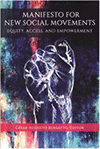
Manifesto for New Social Movements
Equity, Access, & Empowerment
Edited by:
César Augusto Rossatto, The University of Texas at El Paso
Published 2019
The world is currently witnessing the emergence of a new context for education, labor, and transformative social movements. Global flows of people, capital, and energy increasingly define the world we live in. The multinational corporation, with its pursuit of ever-cheaper sources of labor and materials and its disregard for human life, is the dominant form of economic organization, where capital can cross borders, but people can’t.
Affirmative action, democracy, and human rights are moving in from the margins to challenge capitalist priorities of “efficiency”, i.e. exploitation. In some places, the representatives of popular movements are actually taking the reins of state power. Across the globe new progressive movements are emerging to bridge national identities and boundaries, in solidarity with transnational class, gender, and ethnic struggles.
At this juncture, educators have a key role to play. The ideology of market competition has become more entrenched in schools, even as opportunities for skilled employment diminish. We must rethink the relationship between schooling and labor, developing transnational pedagogies that draw upon the myriad social struggles shaping students’ lives and communities. Critical educators need to connect with other social movements to put a radically democratic agenda, based on the principles of equity, access, and emancipation, at the center of educational praxis. Many countries in Latin America like in other continents are developing new alternatives for the reconstruction of social projects; these emerging sources of hope are the central focus of this book. Major historical change always starts with people’s social movement.
Democracy can be one of the best political and social systems in the world but for it to work entails the sustainable participation of citizens. Above all, it requires that people be informed and critically educated since the quality of democracy depends on quality of education. There are 2 kinds of power: money and people. If people exercise their agency, they can be more powerful than money. There are some organizing principles of social movements, as: “don’t do for others what they should do for themselves.” Saul Alinsky wrote: Rules for Radicals: A pragmatic primer for realistic radicals; Mary Rogers: Cold Anger: A story of faith and power politics; Michael Gecan: Going Public: An organizer’s guide to citizen action; and Ernesto Cortez’s, Industrial Area Foundation, are all great sources for organized activism that do work. I put some of these principles to the test and they produced positive results, I was a founder and president of a union at my university and I lived my whole life as an activist and learned that, we can do more together than alone. Now we also have a new digital war with the Cambridge Analitica and Breitbart’s fake news manipulation; however, we also have social-justice hacktivism to counter act it, as well as other democratic social media venues that critical thinkers and activist use. The chapters in this book demonstrate the importance of widening and diversifying social movements, at the same time, emphasizes the need to build cohesive alliances among all the different fronts. What some people think is “impossible” can become a transformed reality, for those who dare attempt changing the world as global citizens.
CONTENTS
Preface. Reclaiming Indigeneity on the U.S.-Mexico Borderlands: Critical Epistemological Praxis for De-colonizing Westernized Teacher Education Programs, César A. Rossatto, Estella L. G. Vallès, roque a. aguon, jr., Maria Elena Rosario (Sharo) Dickerson, and Laura A. Erickson-Alvarado. Unlearning Patriarchy: Out of the Embers of Democracy, the Rise of a Feminist-Centered Movement in a “Trumpopoly” World, Estella L. G. Vallès and César Augusto Rossatto. The Contents and Contours of an Emerging Afro-Caribbean Christian Theology: Implications for Emancipation, Equity and Empowerment, Gosnell Yorke. Gay Social Movement in the “Pegação” [Cruising] Program: The Social Pedagogy of Health and Human Rights for Male Sex Workers in Brazilian Cities, Hiran Pinel and João Porto. Ayotzinapa Manifesto: Education for Revolution, Selfa Chew. Different Paths to Praxis: Teachers Engaged in Radical Democratization of Educational Institutions in Brazil, Louise B. Jennings, Gylton B. Da Matta, and Afra Siqueria Durães. There Will Be Struggle: The Development and Operational Issues of Social Justice Programs at State Universities in the United States of America, Jean Léon Boucher. Lula lá—“The Poor Is the Solution Not the Problem”: Correcting the Racial Divide, Where the Invisibles Can Become Visible in the Brazilian Struggle for Racial Democracy, César Augusto Rossatto. About the Authors.
-
Paperback978-1-64113-791-1
Price: $28.75
-
Hardcover978-1-64113-792-8
Price: $51.75
- eBook978-1-64113-793-5

- POL007000 - POLITICAL SCIENCE: Political Ideologies: Democracy
- POL000000 - POLITICAL SCIENCE: General
-
 Democracy's Discontent and Civic Learning
Multiple Perspectives
Democracy's Discontent and Civic Learning
Multiple Perspectives
-
 Democratizing Leadership
Counter-hegemonic Democracy in Communities, Organizations and Institutions
Democratizing Leadership
Counter-hegemonic Democracy in Communities, Organizations and Institutions
-
 Education for Democracy
A Renewed Approach to Civic Inquiries for Social Justice
Education for Democracy
A Renewed Approach to Civic Inquiries for Social Justice
-
 Hollywood or History?
An Inquiry-Based Strategy for Using Film to Acknowledge Trauma in Social Studies
Hollywood or History?
An Inquiry-Based Strategy for Using Film to Acknowledge Trauma in Social Studies
-
 Sticking Together
How Local Politicians Make Sense of and Respond to International Crises
Sticking Together
How Local Politicians Make Sense of and Respond to International Crises
-
 Sustainable Peace in the Twenty‐First Century
Bridging the Gap from Theory to Practice
Sustainable Peace in the Twenty‐First Century
Bridging the Gap from Theory to Practice

